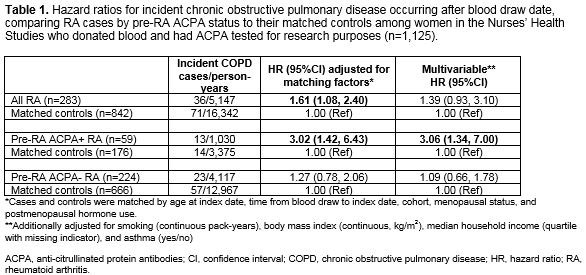Session Information
Date: Sunday, November 10, 2019
Title: 3S078: RA – Diagnosis, Manifestations, & Outcomes I: Pulmonary & Other Comorbidities (839–844)
Session Type: ACR Abstract Session
Session Time: 2:30PM-4:00PM
Background/Purpose: Elevation of anti-citrullinated protein antibodies (ACPA) precedes clinical rheumatoid arthritis (RA) diagnosis by years and may originate at inflamed mucosa, including airways. Damage from chronic inflammation may pre-dispose individuals with ACPA elevation to developing obstructive airway diseases, such as chronic obstructive pulmonary disease (COPD) and asthma, prior to or after clinical RA onset. Therefore, we investigated the association between elevated ACPA in blood banked prior to clinical RA diagnosis and risks for developing COPD or asthma.
Methods: We performed a cohort study among women who donated blood for research purposes in the Nurses’ Health Studies to investigate whether pre-RA elevated ACPA was associated with development of COPD or asthma. RA cases met 1987 ACR or 2010 ACR/EULAR criteria and were each matched to 3 controls by age and menopausal factors at date of RA diagnosis (index date). Pre-RA ACPA elevation among RA cases was defined as: elevation ( >5 units/mL) on 2nd generation commercial assay for cyclic citrullinated peptide or elevation ( >99th percentile of the control distribution) of autoantibodies to ≥2 different citrullinated proteins on a research assay measuring autoantibodies targeting specific citrullinated protein epitopes. Incident COPD or asthma occurring after date of blood draw was determined using biennial questionnaires. Covariates, including smoking pack-years, were assessed by questionnaires. Cox regression estimated HRs for incident COPD and asthma in separate analyses. In all analyses (Figure), the date of blood draw was the baseline, and RA cases (by pre-RA ACPA status) were compared to their matched controls, excluding prevalent respiratory disease at blood draw. We performed a secondary analysis restricting follow-up to time between blood draw and index date to investigate the pre-RA/index period.
Results: We measured ACPA on a total of 1,125 women (283 pre-RA cases and 842 matched controls). Blood was banked mean 9.7 years (SD 5.8) prior to index date and mean age at blood draw was 51.4 years (SD 7.9). There were 59 RA cases (20.8%) with elevated ACPA in pre-RA blood. Pre-RA ACPA+ RA was associated with incident COPD occurring after blood draw (multivariable HR 3.06, 95%CI 1.34, 7.00) compared to their matched controls (Table 1). Pre-RA ACPA+ RA had a HR for asthma of 1.76 (95%CI 0.72, 4.26), similar to the association of Pre-RA ACPA- RA with asthma (HR 1.64, 95%CI 1.04, 2.58) (Table 2). When restricting follow-up to the pre-RA/index period, pre-RA ACPA+ RA was strongly associated with increased COPD risk (HR 10.84, 95%CI 1.13, 104.08), but asthma had similar results to the primary analysis (all RA: HR 1.69, 95%CI 1.00-2.86).
Conclusion: Women with elevated ACPA before RA diagnosis had increased risk for developing COPD, particularly just before RA presentation, suggesting lung damage accrues prior to clinical RA onset. Women who were later diagnosed with RA were more likely to report new-onset asthma than matched controls, regardless of pre-RA ACPA status. These findings provide evidence for the hypothesis that chronic airway inflammation may contribute to both RA development and respiratory outcomes beyond the effect of smoking.
To cite this abstract in AMA style:
Zaccardelli A, Liu X, Ford J, Cui J, Lu B, Chu S, Schur P, Speyer C, Costenbader K, Robinson W, Sokolove J, Karlson E, Camargo C, Sparks J. Elevation of Anti-Citrullinated Protein Antibodies Prior to Rheumatoid Arthritis Onset and Risks for Developing Chronic Obstructive Pulmonary Disease or Asthma [abstract]. Arthritis Rheumatol. 2019; 71 (suppl 10). https://acrabstracts.org/abstract/elevation-of-anti-citrullinated-protein-antibodies-prior-to-rheumatoid-arthritis-onset-and-risks-for-developing-chronic-obstructive-pulmonary-disease-or-asthma/. Accessed .« Back to 2019 ACR/ARP Annual Meeting
ACR Meeting Abstracts - https://acrabstracts.org/abstract/elevation-of-anti-citrullinated-protein-antibodies-prior-to-rheumatoid-arthritis-onset-and-risks-for-developing-chronic-obstructive-pulmonary-disease-or-asthma/



